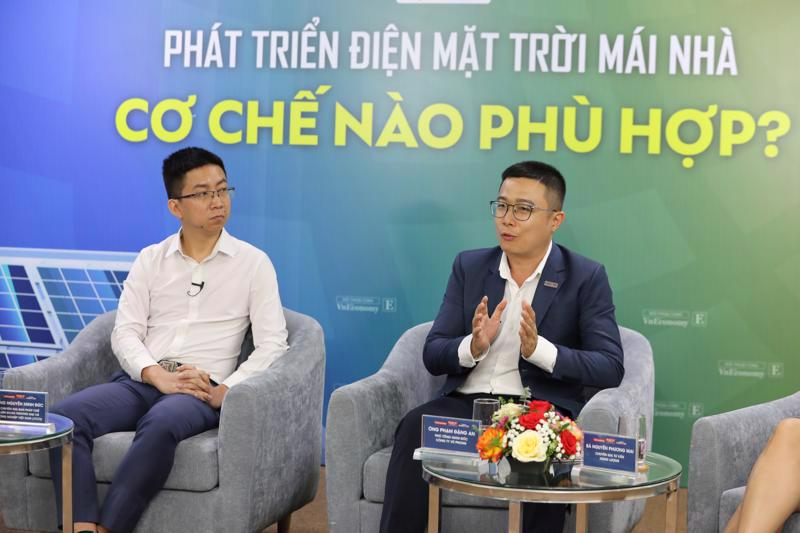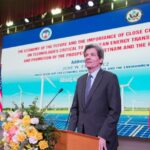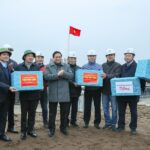On July 10th, the Government Office issued a document to the Ministry of Industry and Trade, the Ministry of Finance, and the Ministry of Justice regarding the development of a decree encouraging the development of rooftop solar power for self-consumption.

To encourage the development of clean energy, the government has asked the Ministry of Industry and Trade to pilot a scheme where excess electricity generated can be sold to the national grid, up to 10% of the total capacity.
The Ministry of Industry and Trade and the Ministry of Finance are tasked with determining a fair purchase price, taking into account shared risks and benefits. The Vietnam Electricity Group (EVN) will be responsible for purchasing this excess electricity, ensuring the safe operation of the power system, and promoting the development of this mechanism.
Additionally, the Ministry of Industry and Trade will collaborate with relevant ministries and agencies to devise solutions and necessary conditions to prevent corruption, wastefulness, and negative impacts on social resources.
The Ministry of Justice will take the lead in ensuring the legality of the decree and its alignment with current regulations, including the Power Development Plan for the period of 2021-2030, with a vision towards 2050 (Power Plan 8).
The government has requested the Ministry of Industry and Trade to finalize the draft decree by July 11th for review, with the aim of issuing it by July 12th.

Rooftop solar power for self-consumption still needs an encouraging and flexible mechanism
Previously, the Government Office also issued Document No. 278/TB-VPCP, conveying the conclusions of Deputy Prime Minister Tran Hong Ha regarding the development and issuance of a decree on encouraging the development of rooftop solar power for self-consumption.
The Deputy Prime Minister instructed the Ministry of Industry and Trade to clarify the concept of self-consumption, emphasizing that electricity generation should primarily be for personal use. For any excess electricity, if energy storage batteries are installed, EVN will propose a reasonable purchase price.
Notably, the price for purchasing electricity during peak hours will be considered, and in the absence of energy storage, EVN will buy it at the lowest price they purchase from other electricity sellers. The excess electricity purchased by EVN can be offset when citizens buy electricity from EVN.
Additionally, the ministry is tasked with monitoring, updating, and transparently disclosing specific data on transmission capacity and renewable energy absorption in each area. This will enable timely adjustments to the power plan based on supply and demand forecasts and technological advancements in green energy conversion, ensuring alignment with regional loads and infrastructure.
Furthermore, a database will be established to determine and disclose the renewable energy consumption of each customer, serving as a basis for the Ministry of Natural Resources and Environment to grant green credits to enterprises. There will also be penalties for violations related to direct electricity sales, including registration, data updates, grid connection, and inspections through a post-inspection mechanism.
However, it is essential to ensure that the development of rooftop solar power aligns with the principles directed by the Government’s leaders in the Implementation Plan for Power Plan 8. Technical solutions must also guarantee the safety of the power grid for large-scale installations in industrial parks and clusters.
“The decree should clearly demonstrate the encouraging mechanism by simplifying procedures and processes, providing technical management and preferential interest rate support,” the Deputy Prime Minister noted. He also emphasized that the development of rooftop solar power for self-consumption will reduce the pressure on the state budget for investing in new power sources. Therefore, further research on this policy is necessary, suggesting that instead of the state investing in new power sources, supporting citizens in installing rooftop solar power systems through funding from this source would be more beneficial in the long term.
“Conquer the Sunshine, Defeat the Rain”: Completing the 500 kV Circuit 3 Line by June 2024, All throughout Tet”
On the afternoon of January 27th, Prime Minister Pham Minh Chinh visited four provinces, namely Thai Binh, Nam Dinh, Ninh Binh, and Thanh Hoa, to inspect the construction and provide encouragement to the construction forces of the 500 kV Transmission Line Project, Circuit 3, from Quang Trach (Quang Binh province) to Pho Noi (Hung Yen province) by handing out gifts.
Bình Dương seeks Lego Group for Lego Land expansion
The provincial leaders of Binh Duong are excited about the opportunity to develop a Lego Land project in the area, using the available clean land resources. They hope that the Lego Group will consider this proposal and invest in the project in the near future.
















